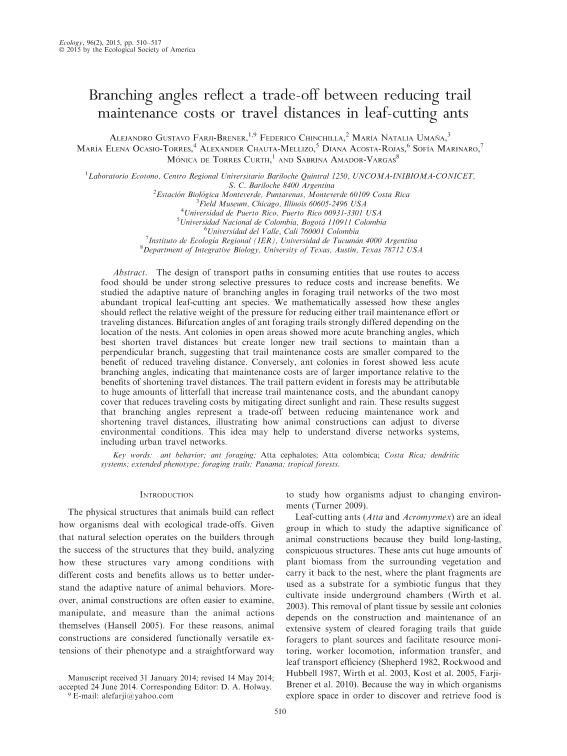Mostrar el registro sencillo del ítem
dc.contributor.author
Farji Brener, Alejandro Gustavo

dc.contributor.author
Chinchilla, Federico
dc.contributor.author
Umaña, Maria Natalia
dc.contributor.author
Ocasio Torres, Maria Elena
dc.contributor.author
Chauta Mellizo, Alexander
dc.contributor.author
Acosta Rojas, Diana
dc.contributor.author
Marinaro Fuentes, María Sofía

dc.contributor.author
de Torres Curth, Monica Irma

dc.contributor.author
Amador Vargas, Sabrina
dc.date.available
2017-01-31T14:55:58Z
dc.date.issued
2015-02
dc.identifier.citation
Farji Brener, Alejandro Gustavo; Chinchilla, Federico; Umaña, Maria Natalia; Ocasio Torres, Maria Elena; Chauta Mellizo, Alexander; et al.; Branching angles reflect a trade-off between reducing trail maintenance costs or travel distances in leaf-cutting ants; Ecological Society Of America; Ecology; 96; 2; 2-2015; 510–517
dc.identifier.issn
0012-9658
dc.identifier.uri
http://hdl.handle.net/11336/12227
dc.description.abstract
The design of transport paths in consuming entities that use routes to access food should be under strong selective pressures to reduce costs and increase benefits. We studied the adaptive nature of branching angles in foraging trail networks of the two most abundant tropical leaf-cutting ant species. We mathematically assessed how these angles should reflect the relative weight of the pressure for reducing either trail maintenance effort or traveling distances. Bifurcation angles of ant foraging trails strongly differed depending on the location of the nests. Ant colonies in open areas showed more acute branching angles, which best shorten travel distances but create longer new trail sections to maintain than a perpendicular branch, suggesting that trail maintenance costs are smaller compared to the benefit of reduced traveling distance. Conversely, ant colonies in forest showed less acute branching angles, indicating that maintenance costs are of larger importance relative to the benefits of shortening travel distances. The trail pattern evident in forests may be attributable to huge amounts of litterfall that increase trail maintenance costs, and the abundant canopy cover that reduces traveling costs by mitigating direct sunlight and rain. These results suggest that branching angles represent a trade-off between reducing maintenance work and shortening travel distances, illustrating how animal constructions can adjust to diverse environmental conditions. This idea may help to understand diverse networks systems, including urban travel networks.
dc.format
application/pdf
dc.language.iso
eng
dc.publisher
Ecological Society Of America

dc.rights
info:eu-repo/semantics/openAccess
dc.rights.uri
https://creativecommons.org/licenses/by-nc-sa/2.5/ar/
dc.subject
Ant Behavior
dc.subject
Atta Cephalotes
dc.subject
Atta Colombica
dc.subject
Costa Rica
dc.subject
Foraging Trails
dc.subject.classification
Zoología, Ornitología, Entomología, Etología

dc.subject.classification
Ciencias Biológicas

dc.subject.classification
CIENCIAS NATURALES Y EXACTAS

dc.title
Branching angles reflect a trade-off between reducing trail maintenance costs or travel distances in leaf-cutting ants
dc.type
info:eu-repo/semantics/article
dc.type
info:ar-repo/semantics/artículo
dc.type
info:eu-repo/semantics/publishedVersion
dc.date.updated
2016-12-12T14:22:23Z
dc.journal.volume
96
dc.journal.number
2
dc.journal.pagination
510–517
dc.journal.pais
Estados Unidos

dc.journal.ciudad
Washington DC
dc.description.fil
Fil: Farji Brener, Alejandro Gustavo. Universidad Nacional del Comahue. Centro Regional Universitario Bariloche. Laboratorio de Ecotono; Argentina. Consejo Nacional de Investigaciones Científicas y Técnicas. Centro Científico Tecnológico Patagonia Norte. Instituto de Investigación en Biodiversidad y Medioambiente; Argentina
dc.description.fil
Fil: Chinchilla, Federico. Estación Biológica Monteverde; Costa Rica
dc.description.fil
Fil: Umaña, Maria Natalia. The Field Museum; Estados Unidos
dc.description.fil
Fil: Ocasio Torres, Maria Elena. Universidad de Puerto Rico; Puerto Rico
dc.description.fil
Fil: Chauta Mellizo, Alexander. Universidad Nacional de Colombia; Colombia
dc.description.fil
Fil: Acosta Rojas, Diana. Universidad del Valle; Colombia
dc.description.fil
Fil: Marinaro Fuentes, María Sofía. Universidad Nacional de Tucumán. Facultad de Ciencias Naturales e Instituto Miguel Lillo. Instituto de Ecología Regional; Argentina
dc.description.fil
Fil: de Torres Curth, Monica Irma. Universidad Nacional del Comahue. Centro Regional Universitario Bariloche. Laboratorio de Ecotono; Argentina. Consejo Nacional de Investigaciones Científicas y Técnicas. Centro Científico Tecnológico Patagonia Norte. Instituto de Investigación en Biodiversidad y Medioambiente; Argentina
dc.description.fil
Fil: Amador Vargas, Sabrina. University Of Texas; Estados Unidos
dc.journal.title
Ecology

dc.relation.alternativeid
info:eu-repo/semantics/altIdentifier/doi/http://dx.doi.org/10.1890/14-0220.1
dc.relation.alternativeid
info:eu-repo/semantics/altIdentifier/url/http://onlinelibrary.wiley.com/doi/10.1890/14-0220.1/abstract
Archivos asociados
